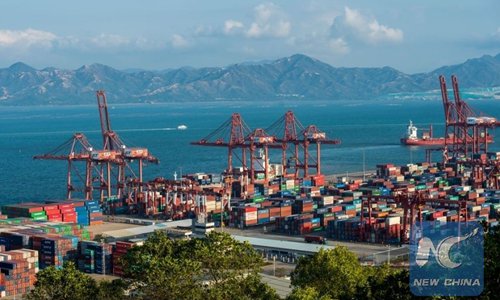
Photo: Xinhua
China's GDP grew by 6.3 percent in the first six months of the year from the same period last year, slower than the second half of 2018 but within the target policymakers had set.
The slower growth underscores the persistent downward pressure on the world's second-largest economy as factors ranging from punitive US tariffs to a domestic cyclical downward pressure kicked in. China is expected to roll out more policies to stabilize the economy, including reserve requirement ratio (RRR) and interest cuts, analysts said.
The country's second quarter GDP grew 6.2 percent year-on-year, the slowest pace in about 27 years, but also fell within the annual target range, data from the National Bureau of Statistics (NBS) showed on Monday.
China set its 2019 growth target between 6 to 6.5 percent in its 2019 Government Work Report. In the first quarter, China achieved GDP growth of 6.4 percent.
China's first half economy "performed within reasonable range" and has "sustained the momentum of progress in overall stability" despite downward pressure from home and abroad, NBS spokesperson Mao Shengyong said at the press conference.
Liu Xuezhi, an economist at the Bank of Communications, said that the slowing GDP growth is a "normal situation" as China undergoes economic transition.
"The slowdown is very mild, not a cliff fall, and China's GDP growth is still relatively high compared with many other economies," Liu told the Global Times, adding that if the economic growth were to get too fast during the economic transition, it would bring side effects such as an industrial glut.
External factors such as the China-US trade war have also weighed on the domestic economy, Liu said.
Liang Haiming, an economist at Hainan University, also said that the first half GDP growth is "within reasonable range and not too bad."
Mainland stock markets rallied in the morning session after the closely watched GDP data was released. The Shanghai market rose by 0.76 percent to 2,952.85 points while the Shenzhen market rose by 1.44 percent to 9345.91 points as of 11:30 am. China's NASDAQ-style board ChiNext rose by 2.32 percent.
Liu said that some positive factors have already manifested in recent economic data, such as the improvement of economic quality.
In the first six months this year, high-tech manufacturing's added value grew 9 percent year-on-year, surpassing the average 6 percent growth of major industrial enterprises. Production of new-energy cars and solar batteries soared by 34.6 percent and 20.1 percent respectively during the period, data released by the NBS showed.
Meanwhile, Chinese residents' disposable income went up by 8.8 percent compared to last year, while retail sales rose by 8.4 percent year-on-year.
Liu said that as the effects of massive tax and fee cuts to shore up the economy will show more clearly in the second half of this year, economic growth is likely to rebound in the coming months, if the external trade environment stabilizes or improves.
"There should be no problem for China to reach its whole-year GDP target," Liu said.
Cong Yi, a professor at the Tianjin University of Finance and Economics, told the Global Times that China's consumption power, driven by strong spending demand from Chinese people, will continue to be a stabilizer for the country's economic growth.
Liang anticipated that the government will launch more policies to stabilize the economy, including further lowering the reserve requirement ratio. It's also possible that interest rate cuts will be rolled out if the economy slides further.
In terms of fiscal policies, the government will continue to cut taxes and fees to add vigor to small and micro enterprises, Liang said.
Global Times
